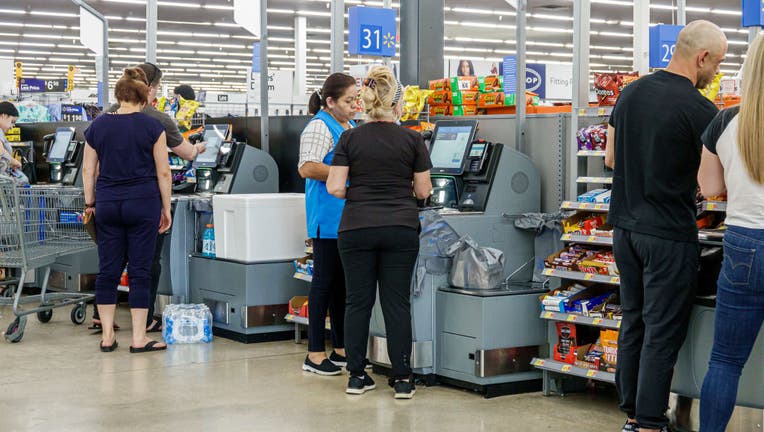Consumers prefer self-check out when purchasing certain personal items: study

FILE - Shoppers use self-checkout registers at a Walmart store as an employee assists customers. A new study suggests many consumers prefer self-checkout for purchasing personal or potentially stigmatized items. (Photo by: Jeffrey Greenberg/Universal Images Group via Getty Images)
LOS ANGELES - When it comes to buying items like condoms, pregnancy tests, or yeast infection treatments, many shoppers would rather deal with a clunky screen than a cashier’s glance. That’s the key takeaway from a newly published study exploring how self-checkout technology changes purchasing behavior around "embarrassing" products.
The research, led by the University of Illinois Urbana-Champaign, suggests that eliminating human interaction at the register can make a noticeable difference in what people buy—and whether they buy it at all.
Analyzing nearly a decade-old rollout of self-checkout lanes, the study found that people were significantly more likely to purchase certain stigmatized products when they had the option to do it privately.
Do shoppers really change what they buy at self-checkout?
The backstory:
The research team, led by assistant professor Becca Taylor from Illinois’ Department of Agricultural and Consumer Economics, studied scanner data from a major grocery store chain with locations in D.C., Maryland, and Virginia. The transactions spanned from 2008 to 2011—a period when self-checkout technology was just being introduced in those stores.
"This period comprised the initial rollout of self-checkout, which helps us better understand the impact. This was the first time that self-checkout was available to shoppers, and we could see how they responded to it," Taylor explained.
What we know:
According to the study, published in the Journal of Economic Behavior & Organization, self-checkout had a measurable effect on stigmatized purchases.
- Purchases of items like condoms, bowel treatments, and yeast infection products increased when self-checkout became available.
- Items like period products, which many consider essential, did not see a similar sales bump.
- In the afternoon shopping hours analyzed, while only 19% of all items were bought at self-checkout, that jumped to 42% for condoms and 43% for pregnancy tests.
These trends held up even when customers had large carts or were buying weighed produce—things that usually make people choose a cashier for convenience.
What we don't know:
The study didn’t include more recent data, so it’s unclear how newer developments—like contactless payments or loyalty apps—affect these trends. The researchers also didn’t include demographics, so it’s unknown whether preferences vary by age, gender, or income.
Why you should care:
As major retailers rethink self-checkout policies, this study highlights what might be lost if those lanes disappear. While some shoppers enjoy interacting with staff, others rely on automation to make personal or uncomfortable purchases with less judgment.
Taylor said, "It may seem like time goes quicker at self-checkout because you are doing all the work yourself. But cashiers can scan much faster, and transaction time is on average 100 seconds shorter. There is a tradeoff between the additional effort at self-checkout versus the privacy gained."
How should stores balance self-checkout and cashier lanes?
What they're saying:
Taylor told the university’s press team that offering both options is crucial: "We found there are some products, particularly fresh produce, floral items, and bulky dog food, that people would rather buy at a cashier register where they can have help."
She added, "This suggests that fully switching to self-checkout would not be welfare-enhancing for consumers. People benefit from being able to decide which type of register to choose."
What's next:
Retailers like Target and Walmart have recently adjusted or rolled back self-checkout in some locations, citing theft concerns and customer preferences.
This study could provide another layer of insight into what those decisions mean for consumers—and how much privacy matters at the register.
The Source: This article is based on a peer-reviewed study published in the Journal of Economic Behavior & Organization and a press release from the University of Illinois Urbana-Champaign. Quotes from Becca Taylor were taken directly from the university’s release, which explained the methodology and results of the study conducted across D.C., Maryland, and Virginia grocery stores.

